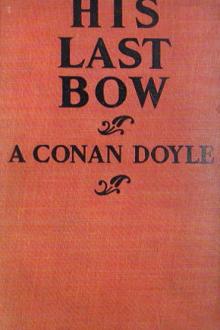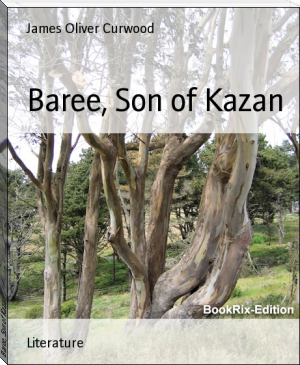Flower of the North, James Oliver Curwood [most popular novels of all time txt] 📗

- Author: James Oliver Curwood
Book online «Flower of the North, James Oliver Curwood [most popular novels of all time txt] 📗». Author James Oliver Curwood
had been happy, laughing and singing as they drew nearer to Fort o' God; each hour had added to the brightness of her eyes, the gladness in her voice. The change had come with Pierre. and at the bottom of it all was Lord Fitzhugh Lee. Pierre had warned him not to mention Lord Fitzhugh's name to Jeanne, and yet only a short time before he had spoken the name boldly before Jeanne, and she had betrayed no sign of recognition or of fear. More than that, she had assured him that she had never heard the name before, that it was not known at Fort o' God.
Philip bowed his head in his hands, and his fingers clutched in his hair. What did it all mean? He went back to the scene on the cliff, when Pierre had roused himself at the sound of the name; he thought of all that had happened since Gregson had come to Churchill, and the result was a delirium of thought that made his temples throb. He was sure--now--of but few things. He loved Jeanne--loved her more than he had ever dreamed that he could love a woman, and he believed that it would be impossible for her to tell him a falsehood. He was confident that she had never heard of Lord Fitzhugh until Pierre overtook them in their flight from Churchill. He could see but one thing to do, and that was to follow Pierre's advice, accepting his promise that in the end everything would come out right. He had faith in Pierre.
He rose to his feet and went to the tent-flap. An embarrassing thought came to him, and he stopped, a flush of feverish color suddenly mounting into his pale cheeks. He had kissed Jeanne in the chasm, when death thundered in their faces. He had kissed her again and again, and in those kisses he had declared his love. He was glad, and yet sorry; the knowledge that she must know of his love filled him with happiness, and yet with it there was the feeling that it would place a distance between him and Jeanne.
Jeanne was the first to see him when he came out of the tent. She was sitting beside a small balsam shelter, and Pierre was busy over a fire, with his back turned to them. For a moment the two looked at each other in silence, and then Jeanne came toward him, holding out one of her hands. He saw that she was making a strong effort to appear natural, but there was something in his own face that made her attempt a poor one. The hand that she gave him trembled. Her lips quivered. For the first time her eyes failed to meet his own in their limpid frankness.
"Pierre has told you what happened," she said. "It was a miracle, and I owe you my life. I have had my punishment for being so careless." She tried to laugh at him now, and drew her hand away. "I wasn't beaten against the rocks, like you, but--"
"It was terrible," interrupted Philip, remembering Pierre's words, and eager to put her at ease. "You have stood up under it beautifully. I am afraid of after effects. You must not collapse under the strain now."
Pierre heard his last words and a smile flashed over his dark face as he encountered Philip's glance.
"It is true, M'sieur," he said. "I know of no other woman who would have stood up under such a thing as Jeanne has done. MON DIEU, when I found a part of the canoe wreckage far below I thought that both of you were dead!"
Philip began to feel that he had foolishly overestimated his strength. There was a weakness in his limbs that surprised him, and a sudden chill replaced the fever in his blood. Jeanne placed her hand upon his arm and thrust him gently toward the tent.
"You must not exert yourself," she said, watching the pallor in his face. "You must be quiet, until after dinner."
He obeyed the pressure of her hand. Pierre followed into the tent, and for a moment he was compelled to lean heavily upon the half- breed.
"It is the reaction, M'sieur," said Pierre. "You are weak after the fever. If you could sleep--"
"I can," murmured Philip, dizzily, dropping upon his balsam. "But, Pierre--"
"Yes, M'sieur."
"I have something--to say to you--no questions--"
"Not now, M'sieur."
Philip heard the rustling of the flap, and Pierre was gone. He felt more comfortable lying down. Dizziness and nausea left him, and he slept. It was the deep, refreshing sleep that always follows the awakening from fever. When he awoke he felt like his old self, and went outside. Pierre was alone; a blanket was drawn across the front of the balsam shelter, and the half-breed nodded toward it in response to Philip's inquiring glance.
Philip ate lightly of the food which Pierre had ready for him. When he had finished he leaned close to him, and said:
"You have warned me to ask no questions, and I am going to ask none. But you have not forbidden me to tell you things which I know. I am going to talk to you about Lord Fitzhugh Lee."
Pierre's dark eyes flashed.
"M'sieur--"
"Listen!" demanded Philip. "I seek your confidence no further. But I shall tell you what I know of Lord Fitzhugh Lee, if it makes us fight. Do you understand? I insist upon this because you have as good as told me that this man is your enemy, and that he is at the bottom of Jeanne's trouble. He is also my enemy. And after I have told you why--you may change your determination to keep me a stranger to your trouble. If not--well, you can hold your tongue then as well as now."
Quickly, without moving his eyes from Pierre's face, Philip told his own story of Lord Fitzhugh Lee. And as he continued a strange change came over the half-breed. When he came to the letters revealing the plot to turn the northerners against his company a low cry escaped Pierre's lips. His eyes seemed starting from his head. Drops of sweat burst out upon his face. His fingers worked convulsively, something rose in his throat and choked him. When Philip had done he buried his face in his hands. For a few moments he remained thus, and then suddenly looked up. Livid spots burned in his cheeks, and he fairly hissed at Philip.
"M'sieur, if this is not the truth--if this is a lie--"
He stopped. Something in Philip's eyes told him to go no further. He was fearless, and he saw more than fearlessness in Philip's face. Such men believe, when they come together.
"It is the truth," said Philip.
With a low, strained laugh Pierre held out his hand as a pledge of his faith.
"I believe in you, M'sieur," he said, and it seemed an effort for him to speak. "Do you know what I would have thought, if you had told this to Jeanne before I came?"
"No."
"I would have thought, M'sieur, that she threw herself purposely into the death of the Big Thunder rocks."
"My God, you mean--"
"That is all, M'sieur. I can say no more. Ah, there is Jeanne!" he cried, more loudly. "Now we will take down the tent, and go."
Jeanne stood a dozen steps behind them when Philip turned. She greeted him with a smile, and hastened to assist Pierre in gathering up the things about the camp. Philip was not blind to her efforts to evade him. He could see that it was a relief to her when they were at last in Pierre's canoe, and headed up the river. They traveled till late in the evening, and set up Jeanne's tent by starlight. The journey was continued at dawn. Late the following afternoon the Little Churchill swept through a low, woodless country, called the White Fox Barren. It was a narrow barren and across it lay the forest and the ridge mountains. Behind these mountains and the forest the sun was setting. Above all else there rose out of the gathering gloom of evening a single ridge, a towering mass of rock which caught the last glow of the sun, and blazed like a signal-fire.
The canoe stopped. Jeanne and Pierre both gazed toward the great rock.
Then Jeanne, who was in the bow, turned her face to Philip, and the glow of the rock itself suffused her cheeks as she pointed over the barren.
"M'sieur Philip," she said, "there is Fort o' God!"
XVI
There was a low tremble in Jeanne's voice. The canoe swung broadside to the slow current, and Philip looked in astonishment at the change in Pierre. The tired half-breed had uncovered his head, and knelt with his face turned to that last crimson glow in the sky, like one in prayer. But his eyes were open, there was a smile on his lips, and he was breathing quickly. Pride and joy came where there had been the lines of grief and exhaustion. His shoulders were thrown back, his head erect, and the fire of the distant rock reflected itself in his eyes. From him Philip turned, so that he could look into Jeanne's face. The girl, too, had changed. Again these two were the Pierre and Jeanne whom he had seen that first night on the moonlit cliff. Pierre seemed no longer the half-breed, but the prince of the rapier and broad cuffs; and Jeanne, smiling proudly at Philip, made him an exquisite little courtesy from her cramped seat in the bow, and said:
"M'sieur Philip, welcome to Fort o' God!"
"Thank you," he said, and stared toward the sun-capped rock.
He could see nothing but the rock, the black forests, and the desolate barren stretching between. Fort o' God, unless it was the rock itself, was still a mystery hidden in the gathering gloom. The canoe began moving slowly onward, and Jeanne turned so that her eyes searched the stream ahead. A thick wall of stunted forest shut out the barren from their view; the stream grew narrower, and on the opposite side a barren ridge, threatening them with torn and upheaved masses of rock, flung the heavy shadows of evening down upon them. No one spoke. Philip could hear Pierre breathing behind him: something in the intense quiet--in the awesome effect which their approach to Fort o' God had upon these two--sent strange little thrills shooting through his body. He listened, and heard nothing, not even the howl of a dog. The stillness was oppressive, and the darkness thickened about them. For half an hour they continued, and then Pierre headed the canoe into a narrow creek, thrusting it through a thick growth of wild rice and reeds,
Balsam and cedar and swamp hazel shut them in. Overhead the tall cedars interlaced, and hid the pale light of the sky. Philip could just make out Jeanne ahead of him.
And then, suddenly, there came a wonderful change. They shot out of the darkness, as if from a tunnel, but so quietly that one a dozen feet away could not have heard the ripple of Pierre's paddle. Almost in their faces rose a huge black bulk, and in that blackness three or four yellow lights gleamed like mellow stars. The canoe touched noiselessly upon sand. Pierre sprang out, still without sound. Jeanne followed, with a whispered word. Philip was last.
Pierre pulled the canoe up, and Jeanne came to Philip. She held out her two hands. Her face shone white in the gloom, and there was a look in her beautiful eyes, as she stood for a moment almost touching him, that set his heart jumping. She let her hands lie in his while she spoke.
"We have not even alarmed the dogs, M'sieur Philip," she whispered.
Philip bowed his head in his hands, and his fingers clutched in his hair. What did it all mean? He went back to the scene on the cliff, when Pierre had roused himself at the sound of the name; he thought of all that had happened since Gregson had come to Churchill, and the result was a delirium of thought that made his temples throb. He was sure--now--of but few things. He loved Jeanne--loved her more than he had ever dreamed that he could love a woman, and he believed that it would be impossible for her to tell him a falsehood. He was confident that she had never heard of Lord Fitzhugh until Pierre overtook them in their flight from Churchill. He could see but one thing to do, and that was to follow Pierre's advice, accepting his promise that in the end everything would come out right. He had faith in Pierre.
He rose to his feet and went to the tent-flap. An embarrassing thought came to him, and he stopped, a flush of feverish color suddenly mounting into his pale cheeks. He had kissed Jeanne in the chasm, when death thundered in their faces. He had kissed her again and again, and in those kisses he had declared his love. He was glad, and yet sorry; the knowledge that she must know of his love filled him with happiness, and yet with it there was the feeling that it would place a distance between him and Jeanne.
Jeanne was the first to see him when he came out of the tent. She was sitting beside a small balsam shelter, and Pierre was busy over a fire, with his back turned to them. For a moment the two looked at each other in silence, and then Jeanne came toward him, holding out one of her hands. He saw that she was making a strong effort to appear natural, but there was something in his own face that made her attempt a poor one. The hand that she gave him trembled. Her lips quivered. For the first time her eyes failed to meet his own in their limpid frankness.
"Pierre has told you what happened," she said. "It was a miracle, and I owe you my life. I have had my punishment for being so careless." She tried to laugh at him now, and drew her hand away. "I wasn't beaten against the rocks, like you, but--"
"It was terrible," interrupted Philip, remembering Pierre's words, and eager to put her at ease. "You have stood up under it beautifully. I am afraid of after effects. You must not collapse under the strain now."
Pierre heard his last words and a smile flashed over his dark face as he encountered Philip's glance.
"It is true, M'sieur," he said. "I know of no other woman who would have stood up under such a thing as Jeanne has done. MON DIEU, when I found a part of the canoe wreckage far below I thought that both of you were dead!"
Philip began to feel that he had foolishly overestimated his strength. There was a weakness in his limbs that surprised him, and a sudden chill replaced the fever in his blood. Jeanne placed her hand upon his arm and thrust him gently toward the tent.
"You must not exert yourself," she said, watching the pallor in his face. "You must be quiet, until after dinner."
He obeyed the pressure of her hand. Pierre followed into the tent, and for a moment he was compelled to lean heavily upon the half- breed.
"It is the reaction, M'sieur," said Pierre. "You are weak after the fever. If you could sleep--"
"I can," murmured Philip, dizzily, dropping upon his balsam. "But, Pierre--"
"Yes, M'sieur."
"I have something--to say to you--no questions--"
"Not now, M'sieur."
Philip heard the rustling of the flap, and Pierre was gone. He felt more comfortable lying down. Dizziness and nausea left him, and he slept. It was the deep, refreshing sleep that always follows the awakening from fever. When he awoke he felt like his old self, and went outside. Pierre was alone; a blanket was drawn across the front of the balsam shelter, and the half-breed nodded toward it in response to Philip's inquiring glance.
Philip ate lightly of the food which Pierre had ready for him. When he had finished he leaned close to him, and said:
"You have warned me to ask no questions, and I am going to ask none. But you have not forbidden me to tell you things which I know. I am going to talk to you about Lord Fitzhugh Lee."
Pierre's dark eyes flashed.
"M'sieur--"
"Listen!" demanded Philip. "I seek your confidence no further. But I shall tell you what I know of Lord Fitzhugh Lee, if it makes us fight. Do you understand? I insist upon this because you have as good as told me that this man is your enemy, and that he is at the bottom of Jeanne's trouble. He is also my enemy. And after I have told you why--you may change your determination to keep me a stranger to your trouble. If not--well, you can hold your tongue then as well as now."
Quickly, without moving his eyes from Pierre's face, Philip told his own story of Lord Fitzhugh Lee. And as he continued a strange change came over the half-breed. When he came to the letters revealing the plot to turn the northerners against his company a low cry escaped Pierre's lips. His eyes seemed starting from his head. Drops of sweat burst out upon his face. His fingers worked convulsively, something rose in his throat and choked him. When Philip had done he buried his face in his hands. For a few moments he remained thus, and then suddenly looked up. Livid spots burned in his cheeks, and he fairly hissed at Philip.
"M'sieur, if this is not the truth--if this is a lie--"
He stopped. Something in Philip's eyes told him to go no further. He was fearless, and he saw more than fearlessness in Philip's face. Such men believe, when they come together.
"It is the truth," said Philip.
With a low, strained laugh Pierre held out his hand as a pledge of his faith.
"I believe in you, M'sieur," he said, and it seemed an effort for him to speak. "Do you know what I would have thought, if you had told this to Jeanne before I came?"
"No."
"I would have thought, M'sieur, that she threw herself purposely into the death of the Big Thunder rocks."
"My God, you mean--"
"That is all, M'sieur. I can say no more. Ah, there is Jeanne!" he cried, more loudly. "Now we will take down the tent, and go."
Jeanne stood a dozen steps behind them when Philip turned. She greeted him with a smile, and hastened to assist Pierre in gathering up the things about the camp. Philip was not blind to her efforts to evade him. He could see that it was a relief to her when they were at last in Pierre's canoe, and headed up the river. They traveled till late in the evening, and set up Jeanne's tent by starlight. The journey was continued at dawn. Late the following afternoon the Little Churchill swept through a low, woodless country, called the White Fox Barren. It was a narrow barren and across it lay the forest and the ridge mountains. Behind these mountains and the forest the sun was setting. Above all else there rose out of the gathering gloom of evening a single ridge, a towering mass of rock which caught the last glow of the sun, and blazed like a signal-fire.
The canoe stopped. Jeanne and Pierre both gazed toward the great rock.
Then Jeanne, who was in the bow, turned her face to Philip, and the glow of the rock itself suffused her cheeks as she pointed over the barren.
"M'sieur Philip," she said, "there is Fort o' God!"
XVI
There was a low tremble in Jeanne's voice. The canoe swung broadside to the slow current, and Philip looked in astonishment at the change in Pierre. The tired half-breed had uncovered his head, and knelt with his face turned to that last crimson glow in the sky, like one in prayer. But his eyes were open, there was a smile on his lips, and he was breathing quickly. Pride and joy came where there had been the lines of grief and exhaustion. His shoulders were thrown back, his head erect, and the fire of the distant rock reflected itself in his eyes. From him Philip turned, so that he could look into Jeanne's face. The girl, too, had changed. Again these two were the Pierre and Jeanne whom he had seen that first night on the moonlit cliff. Pierre seemed no longer the half-breed, but the prince of the rapier and broad cuffs; and Jeanne, smiling proudly at Philip, made him an exquisite little courtesy from her cramped seat in the bow, and said:
"M'sieur Philip, welcome to Fort o' God!"
"Thank you," he said, and stared toward the sun-capped rock.
He could see nothing but the rock, the black forests, and the desolate barren stretching between. Fort o' God, unless it was the rock itself, was still a mystery hidden in the gathering gloom. The canoe began moving slowly onward, and Jeanne turned so that her eyes searched the stream ahead. A thick wall of stunted forest shut out the barren from their view; the stream grew narrower, and on the opposite side a barren ridge, threatening them with torn and upheaved masses of rock, flung the heavy shadows of evening down upon them. No one spoke. Philip could hear Pierre breathing behind him: something in the intense quiet--in the awesome effect which their approach to Fort o' God had upon these two--sent strange little thrills shooting through his body. He listened, and heard nothing, not even the howl of a dog. The stillness was oppressive, and the darkness thickened about them. For half an hour they continued, and then Pierre headed the canoe into a narrow creek, thrusting it through a thick growth of wild rice and reeds,
Balsam and cedar and swamp hazel shut them in. Overhead the tall cedars interlaced, and hid the pale light of the sky. Philip could just make out Jeanne ahead of him.
And then, suddenly, there came a wonderful change. They shot out of the darkness, as if from a tunnel, but so quietly that one a dozen feet away could not have heard the ripple of Pierre's paddle. Almost in their faces rose a huge black bulk, and in that blackness three or four yellow lights gleamed like mellow stars. The canoe touched noiselessly upon sand. Pierre sprang out, still without sound. Jeanne followed, with a whispered word. Philip was last.
Pierre pulled the canoe up, and Jeanne came to Philip. She held out her two hands. Her face shone white in the gloom, and there was a look in her beautiful eyes, as she stood for a moment almost touching him, that set his heart jumping. She let her hands lie in his while she spoke.
"We have not even alarmed the dogs, M'sieur Philip," she whispered.
Free e-book «Flower of the North, James Oliver Curwood [most popular novels of all time txt] 📗» - read online now
Similar e-books:





Comments (0)